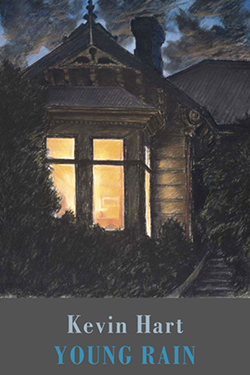Young Rain
by Kevin Hart
reviewed by William Doreski
The best poems in Kevin Hart’s new collection are very much his own, and the weaker ones characterize our literary moment. An appealing and amusing poem entitled “Finland” begins “I could stay here all day inside my house / Or go to Finland.” While this opening might seem Billy Collins whimsical, the poem develops beyond that jaunty mode into a not too serious but purposeful meditation on the aesthetic and social necessities of life:
I know those lean old towns where no one walks
And I can do without
Those streets made endless by the sun or lack of sun.
This syntax-parsing free verse, frequently alternating long and short lines, is one characteristic rhythmic mode, but Hart sometimes varies it with strong enjambments:
You wrote, in your last words to me,
“And now—all this,” meaning
Each word had turned
Its back on you . . .
Reserving enjambment for suitably dramatic, usually emotional moments, Hart avoids the common tendency to use it as a design element rather than a poetic strategy.
The voice most frequently encountered in this poetry is one of meditation or even prayer; one of the best poems is actually entitled “Prayer.” Few contemporary poets would risk exposing such unfashionably extra-literary purpose, but this is a beautiful poem—elegantly composed, rhetorically delicate, and unexpectedly closing with a turn from the anaphora and gently rhythmic syntax of the rest of the poem. The opening lines—“O come, in any way you want, / In morning sunlight fooling in the leaves, / Or in thick bouts of rain that soak my head”—seem to invoke the comforting pantheism of the Transcendentalists. Even as the poem shifts from the invocation of a deity to that of a beloved—“Come as you used to, years ago, / When I first fell for you”—the mingling of divine and human passions seems easeful and unthreatening. But the climax startles not only with a violent image but a rupture of the rhetorical contract with the reader:
Or if that’s not your way these days
Because of me, because
Of something dead in me,
Come like a jagged knife into my gut
Because your touch will surely cut
The rhyme with the italicized refrain established at the opening of the poem assumes a new harshness, and the enjambment of the second line, insisting on cause and effect, resists the poem’s comforting tone of invocation and replaces it with admonition. The poem then pushes on, having absorbed this anxious moment, and concludes “Come any way you want // But come,” revising its opening motif with a painful and resigned urgency. In its modest way, this poem embodies a vast world of self-knowing, an understanding of prayer as a self-serving and vital link to both the divine and the human ineffable.
Several of Hart’s other poems reiterate this successful motif, most notably the sequence “Dark Retreat” in the last section of the book. But it would be wrong to characterize Hart as a religious poet, despite his transcendental leanings. His work displays considerable diversity in subject matter and tone. For instance, another of his effective modes is lightly humorous, as in the concluding poem, “Mud”:
The thick wild stench of that raw mud, oh yes,
I think you wander there and drink it in
On days before those pipes and cylinders
Were ever thought,
And spend long hours with every slow rich curve
As my fat river deepens some and sleeps;
You lay right down in it and float away
Past squiggly creeks . . .
Aside from the grammatical solecism (shouldn’t that lay be lie?) this is deliciously sensuous writing—“fat river deepens some and sleeps” is wonderful, the “some” the wittiest word in the poem. Hart has an authentic feel for the meat of language: the rhetoric, the sonorities, the thickening of vowels, and the rasp of consonants rubbing together. His best poems revel in the texture of their lines.
As for the weaker poems: we live in a grossly sentimental age, and much of the poetry we churn up is a postmodern rehash of Victorian newspaper verse. One or two of Hart’s poems succumb to the febrile notion of art that fuels too many poems about departed parents and grandparents. “Inside” is one such poem. In attempting to depict an honest emotion it stumbles over the cliché of empty clothes representing the dear departed:
One day that suit will come
Folded beside a dress
(I walk from room to room
Inside my mother’s death)
Few poets have managed to make compelling poems about a parent’s death. Robert Lowell’s “Sailing Home from Rapallo” is a fine poem, but it has tempted too many imitators. Most of us have mothers, and we all write about them sooner or later, but we only occasionally transcend the incompletely tranquilized emotion that fuels such poems. Hart falls for a few other clichés and unruly abstractions, such as the “quietness” in the last line of “The Word,” but fortunately he has written many good poems that avoid these pitfalls, and produced a solid and rewarding book.
Published on June 21, 2013

